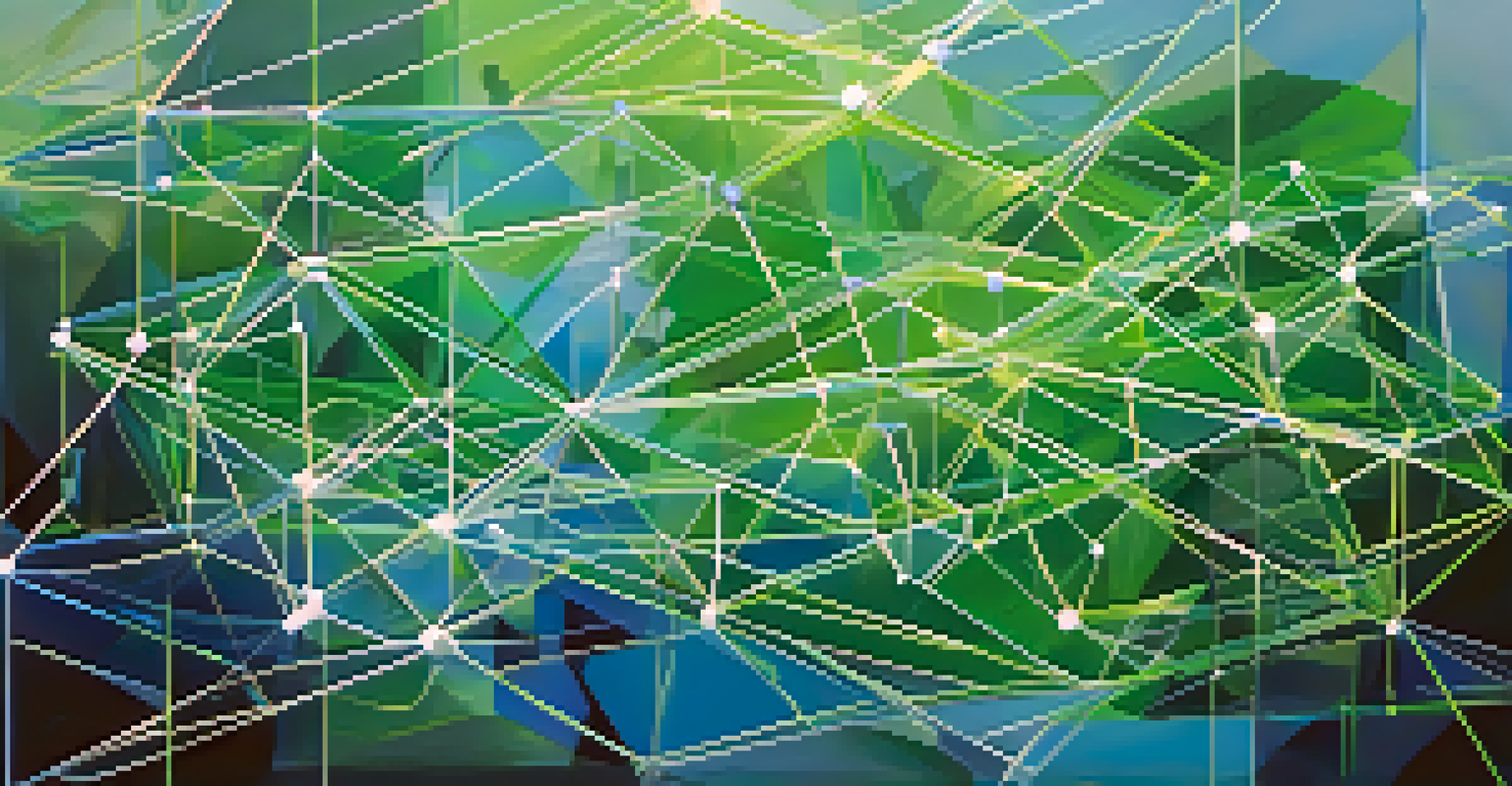Challenges in Developing Decentralized Social Networks

Understanding Decentralized Social Networks
Decentralized social networks are platforms that operate without a central authority, allowing users to interact directly. This model contrasts sharply with traditional networks like Facebook or Twitter, where a single entity controls the data and user experience. By distributing control, decentralized networks aim to enhance privacy and freedom of expression, making them attractive to many users seeking alternatives.
The future is already here — it's just not very evenly distributed.
However, the concept can feel abstract at first. Imagine a neighborhood where everyone shares a common space without a landlord dictating the rules. Each person has a say, but this can also lead to challenges in governance and decision-making. Understanding this balance is crucial as we dive deeper into the challenges of developing such networks.
As we explore this topic, it's important to recognize that while decentralization offers many benefits, it also brings unique hurdles that developers and users must navigate together. Let's take a closer look at these challenges.
Technical Complexity and Development Challenges
Building a decentralized social network involves intricate technical challenges that can be daunting. Developers must ensure that the platform is not only functional but also secure and scalable to handle a growing user base. This often requires advanced knowledge of blockchain technology, peer-to-peer networking, and cryptographic protocols, which can be a steep learning curve for many.

Moreover, the lack of established frameworks and standards can lead to inconsistencies across different platforms. Think of it like piecing together a puzzle where each piece represents a different technology or programming language; without a clear picture, it’s easy to get lost. This complexity can slow down the development process and lead to increased costs.
Decentralization Enhances User Control
Decentralized social networks empower users by eliminating central authority, enhancing privacy, and improving freedom of expression.
Ultimately, while the technical challenges may seem overwhelming, they also present an opportunity for innovation. Developers who rise to meet these challenges can create robust systems that redefine how we connect online.
User Experience and Interface Design Issues
User experience (UX) is crucial for the success of any social network, and decentralized platforms are no exception. A clunky or unintuitive interface can deter users from engaging with the network, regardless of its decentralization benefits. Designers must focus on making the platform user-friendly, ensuring that everyone—from tech-savvy individuals to those less familiar with technology—can navigate it with ease.
The best way to predict the future is to invent it.
Imagine trying to use a new smartphone with a complicated interface; it can be frustrating and lead to abandonment. In decentralized networks, the challenge lies in balancing advanced features with simplicity. If users find the platform difficult to use, they may quickly return to familiar, centralized options that require less effort.
Thus, creating an appealing UX is not just about aesthetics; it’s about fostering community and encouraging participation, which are vital for the platform's growth and sustainability.
Governance and Moderation Challenges
In decentralized networks, governance becomes a complex issue since there is no central authority to enforce rules or policies. This can create a Wild West scenario where harmful behavior may go unchecked, making moderation a significant challenge. Communities must find ways to self-regulate and establish rules that everyone can agree upon, which can be easier said than done.
Consider a group of friends trying to decide on a movie to watch; it can quickly devolve into chaos without a leader to guide the decision. In the same way, decentralized networks need effective governance mechanisms to ensure that all voices are heard while maintaining order and safety. This might involve voting systems, community-led moderation, or other democratic processes.
Technical Challenges Require Innovation
Building decentralized platforms involves complex technical hurdles that can inspire developers to create innovative solutions.
Finding the right balance between freedom of expression and necessary moderation is essential for fostering a healthy online environment. As decentralized networks evolve, experimenting with governance models will be key.
Privacy and Security Concerns
One of the main draws of decentralized social networks is the promise of enhanced privacy and security for users. However, achieving true privacy is fraught with challenges. Developers must ensure that user data remains secure from malicious actors while also providing transparency about how data is handled—an often tricky balance to strike.
Think of it like locking your front door; it’s essential for security, but if you leave the windows open, your privacy is compromised. In decentralized networks, users may have different expectations about privacy, making it vital to communicate effectively about the measures in place. This can involve complex encryption strategies and user education on best practices.
Ultimately, addressing privacy and security concerns is critical for building trust. Users are more likely to engage with a platform that prioritizes their safety and privacy, making this a crucial challenge for developers.
Building a Sustainable Community
Creating a vibrant and engaged community is essential for the success of any social network, but decentralized platforms face unique hurdles in this regard. Without the backing of a central authority, fostering user engagement and loyalty can be challenging. Developers must find innovative ways to incentivize participation and create a sense of belonging among users.
Imagine a neighborhood potluck where everyone brings a dish; if only a few people show up, the event loses its charm. Similarly, decentralized networks need active participation to thrive. This might involve hosting regular events, encouraging user-generated content, and implementing reward systems that recognize contributions.
Community Engagement Drives Success
A sustainable decentralized network relies on active community participation and innovative engagement strategies to thrive.
As communities grow and evolve, ongoing engagement efforts are critical. Building a sustainable community means fostering relationships and ensuring that users feel valued and connected.
Funding and Monetization Strategies
Funding a decentralized social network poses challenges that differ from traditional platforms. Without a central authority, finding consistent revenue streams can be tricky, as many users may resist advertising or subscription models that are commonly used elsewhere. Developers must think creatively about monetization while maintaining the core values of decentralization.
Consider a coffee shop that relies on customer loyalty rather than flashy advertisements; it’s all about building relationships. Similarly, decentralized networks can explore alternative revenue models, such as community donations, cryptocurrency incentives, or premium features that enhance the user experience.

Ultimately, finding the right funding strategy is crucial for sustainability. Developers need to strike a balance between generating revenue and keeping the community engaged and satisfied.
The Future of Decentralized Social Networks
Despite the numerous challenges, the future of decentralized social networks holds significant promise. As more users seek alternatives to traditional platforms, developers have the opportunity to create environments that prioritize user control and privacy. Innovations in technology and governance can pave the way for healthier online communities that truly reflect user needs.
Imagine a world where social media fosters genuine connections rather than superficial likes; this is the vision many have for decentralized networks. As developers continue to address the challenges outlined, we may see a shift in how we interact online, focusing more on meaningful engagement.
While the journey is fraught with obstacles, the potential for transformative change is immense. The future of social networking could very well depend on how effectively we can navigate these challenges together.